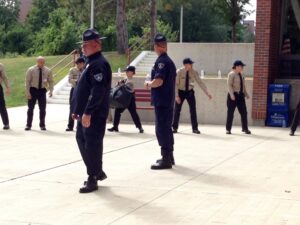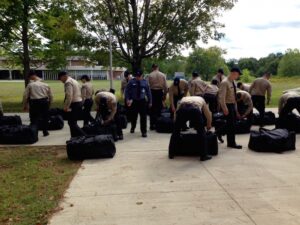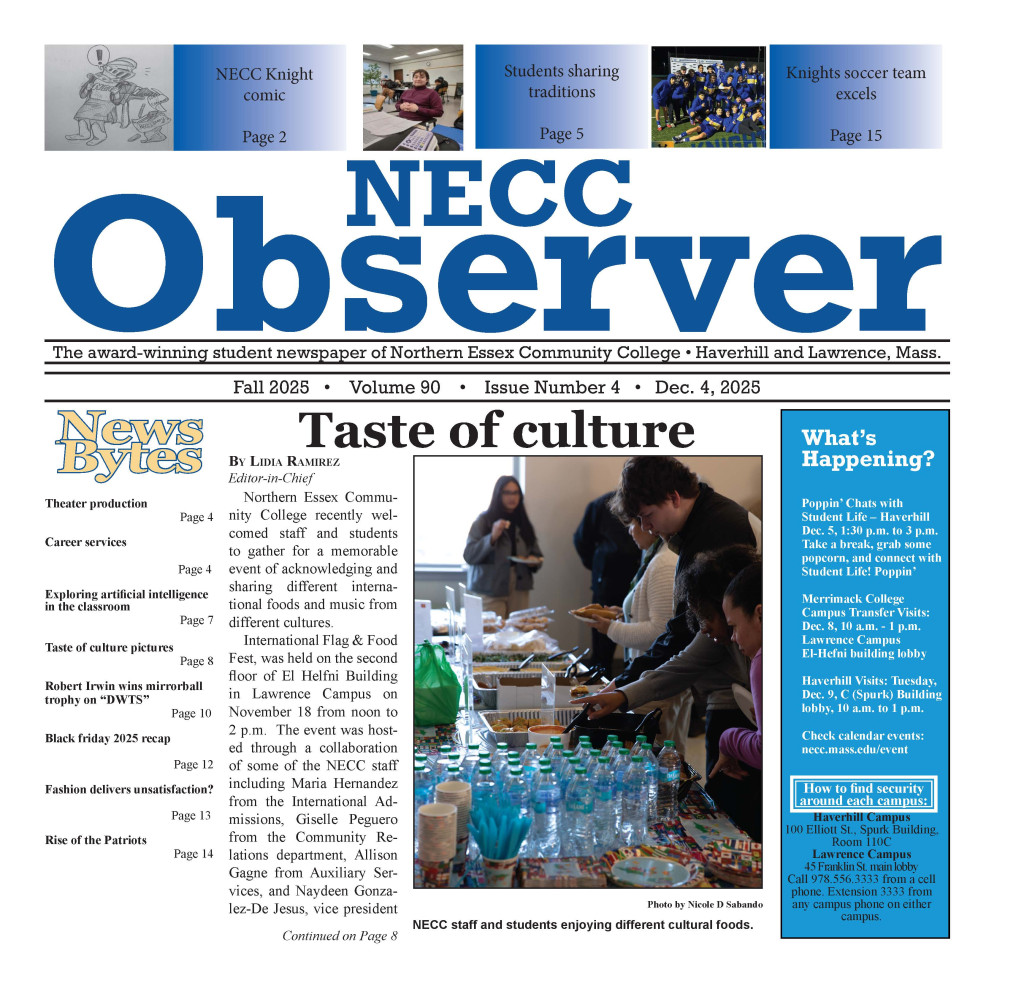In Massachusetts, the number of full time employees is 1,400 statewide. Part-timers? 5,200 statewide. Adjunct professors teach about two-thirds of the classes taught at the state’s 15 community colleges. They are part-time employees, paid per class. They receive none of the same benefits as full-time employees, such as healthcare and retirement plans, for example.
Joe LeBlanc is a full-time professor at NECC and president of the Massachusetts Community College Council (MCCC). This union represents both the full time and adjunct professors, as well as other professional staff and faculty, at all 15 community colleges in the state.
LeBlanc said, “We have sued the state for that issue (medical coverage) and we did not win that suit. I think all health care ought to be free. A lot of it is driven by profit.” State law classifies the adjuncts as contract employees; therefore, the state is not required to provide them with health insurance. “I don’t agree with the law, but we have been working to change that law and the universal health care law we have now helped to an extent. They should have the same pension that I have. There could be some friction there between those that are purely part time, and they teach at two, three, four institutions just to pay the rent…”
“The percentage of adjuncts is pretty high. Twenty adjuncts could be four full time instructors. I would like to see more hope for those who want/need a permanent full time job with benefits,” Developmental Studies Adjunct Professor, Christopher Corcoran, said.
The practice of using adjuncts began as a way to allow working professionals to apply their knowledge in the classroom, but as the number of students increased, the number of full time teachers remained stagnant. The additional caseload was passed on to these part time employees.
“Right now it’s shrinking a bit, because our enrollments are dropping,” said LeBlanc. “Historically, during great times, everybody has work.”
Academic Preparation Adjunct, Kelly Boylan, adds that job security is often difficult because an adjunct’s course load is determined by student enrollment. “I strive to have a strong relationship with my students and put their needs first. As an adjunct, I don’t have an office, but I make myself available to my students.”
The result of this trend is that many adjunct professors are teaching a full caseload, sometimes even teaching multiple classes at multiple campuses.
“What’s even worse is the fact that ‘Jane Smith’ can work an entire career adjuncting and she will not have a pension and she does not have any way to retire unless she has a source of outside income or she inherits cash. If you choose to toil away in the trenches as an adjunct for your entire career (you) cannot afford to retire,” said LeBlanc.
Corcoran explains the give-and-take of being an adjunct by showing what happens when classes get cancelled: “If we don’t continually teach, in time we lose certain benefits and our pay-scale is reduced. But we don’t get offered courses continually and consistently. So most of us need to have other jobs and often, when we do get offered courses, those courses conflict with those other jobs. Also, I am not sure of how it works with the seniority of adjuncts and who gets offered courses first. One colleague has taught eight adjunct courses!”
An Inside Higher Ed article by Colleen Flaherty earlier this year said “A common refrain from adjunct professors who get relatively low pay and little institutional support is that their working conditions are students’ learning conditions. But many colleges and universities continue to ignore that message and rely on part-time faculty to deliver the majority of instruction. A new paper is calling out those institutions for their lack of attention to faculty career designs and is demanding meaningful, collaborative discussions to address what it calls an existential threat to American higher education.”
“Part-time adjuncts who want full-time jobs should have more full-time opportunities available to them. Non-academic work could be combined with our teaching duties to create full-time positions with contracts and healthcare. We don’t always have to be tenure-track professors with a private office. Just a full-time job would be nice. Yes, maybe we would be considered over-qualified to do clerical work, but I doubt we would turn it down in order to get a full-time, permanent, benefitted position. We have paid our dues!” said Corcoran.
Fairness for adjunct professors has become a hot-button issue between state lawmakers and advocates for change; specifically, The Massachusetts Teachers Association (MTA) and the Massachusetts Community College Council (MCCC).
Jerome Fallon, Adjunct in Global Studies, said, “You only convene for 16 classes maximum so it is vital to get to know your students quickly. Reach people immediately on a personal and respectful level from the beginning. For me, it is not about me instructing the student it is about us finding a way to succeed as a two person team. With 30 or so students, that’s 30 teams you need to try to create. It’s time consuming and requires effort but it also portrays to the student that you are committed.”
“The disadvantage is not getting classes that work with your other jobs, inconsistency with course availability, never getting to teach those courses that you love and are actually better suited for, losing the money we rely on, and the constant wonder if you will always be adjunct. But a big disadvantage to me is when students ask me at the end of the semester and even years later ‘What courses are you teaching next semester? What else can I take with you?’ It is sad that I can never answer them, and it breaks my heart,” said Corcoran.
“I think there are varied types of adjuncts so they cannot be stereotyped as one group. There are those who want to be involved in the school and students and those who just want to teach a course without further interaction. Each person has their own schedule and style of interaction,” said Mark Beaudry, an adjunct for the Department of Behavioral Sciences.
Fallon said, “I love being around the academic atmosphere. I enjoy the fact that people are trying to improve themselves through education and am genuinely grateful to be part of that process. A disadvantage is that I do not get to do it enough. I have decades of industry experience to share and would love to find other avenues besides the classroom to make that happen. With the help of the department staff, I’m starting to make some progress.”
Another glaring difference for an adjunct professor is their lack of accessibility for students who may be seeking extra help. Full time professors also serve as advisers and they have the opportunity to develop a bond with students. The MTA website states that, “Higher ed faculty members see this as a significant issue because establishing such connections can contribute to long-term success — and at times may determine whether a student remains in school.”
Angel Baez, a 20 year old Liberal Arts Major, said, “Limited office hours hurt students ability to flourish and get the help they need to do so. A lot of adjunct professors have a lengthy commute, and therefore limits their time on campus. Which in turn reduces or eliminates their office hours due to the excessive inconvenience.”
Technology is a definite aid to adjuncts with little office time. Corcoran said, “I do believe adjuncts are able to give a more personal level of detail because we simply have less students. I feel I can get closer to them because I can spend more time with each one in and out of the classroom, can get to know them, their purpose, goals and reason for being there and how that relates to the course I am teaching. I can answer emails with more detail, and discuss with them in person before and after class with a little more ease. As a core subject instructor, I simply have more time to explain where my course falls in the real world, their formal education, and why it is so important to finish it. Even if they hate every minute of it.”
“Holding office hours is a little difficult when I have to travel between the two campuses with only a short amount of time between classes. I often will arrive before class when possible or stay later when necessary.” said Boylan.
“I feel that adjuncts have much passion about their discipline and share their entire life experience with students, which provides a true global perspective. So, they should be compensated based on the education, experience and creative development skills that they bring to the classroom. Because I bring international experience and a theoretical perspective to the classroom, students have an appreciation for the real concepts being taught,” said Beaudry.
“I am just as much a student in my classroom as the students are (but) in different ways. It’s a cliche, but I do learn a lot from them,” said Corcoran. “My role is to facilitate the interchange of ideas, and make them comfortable in doing so and to make them understand the value in those ideas and how to apply them in the outside world.
All of this is not to say that college campuses are the only place where employees are exploited. On the contrary, there are quite a few industries that rely on sub-contractors to do much of the work, but the inequality between the adjunct professors and the full-time, union protected faculty is undeniable and is likely to remain that status quo for the foreseeable future.
In 2009, the MTA, the MCCC and five professors, including NECC professor Patrick Lochelt, filed suit against the state seeking health insurance coverage for adjunct professors, but they were unsuccessful. Health insurance costs are soaring throughout the country but it is particularly noteworthy in Massachusetts, where health insurance is mandatory. This forces the adjunct professors to make hard budgeting decisions that can negatively impact their quality of life.
Fallon said, “Having access to healthcare would be great, but it does not look like it is going to happen. I know the union is working diligently on behalf of all faculty and I confess to not knowing as much as I should about the negotiations. It’s probably best that I do not comment on things I do not know anything about, unlike some presidential candidates.”
“Healthcare is a nightmare. But adjuncts do have an office! I call it the ‘Dorm-Office,’ as it is like a quad in that it has many desks. No parties though. Or none that I have been invited to,” Corcoran said. “I have often said that if we really figured out our true hourly wage, we would be better off at Walmart with healthcare and a set schedule. I think the hardest part is coming to the realization that it is what it is, and will probably always be so.”
According to Fallon, one improvement might be to have additional training options available for IT topics for adjuncts. “I get great support when I call in to the tech groups, but it would be ideal if there was someone there at night who I could visit to learn the nuances.” said Fallon.
“They (the part-time instructors) are going to get a 4 percent raise in January. It’s up to the college to pay that 4 percent raise, but I’ll also say that the part-time instructors here are largely a cash cow in that you only have to have eight or nine in a class to pay the paycheck of that instructor,” LeBlanc said.
He said that he would like to think that there isn’t any friction between the full and part timers, but that they live a precarious life where they can never really guarantee what their income will be, because when budgets are cut, the adjunct contracts are the first to go.
“These are a couple of points of great shame, I think. This state, with its reputation of having great higher ed, has this underclass of workers that they choose to exploit and it needs to end,” said LeBlanc.




